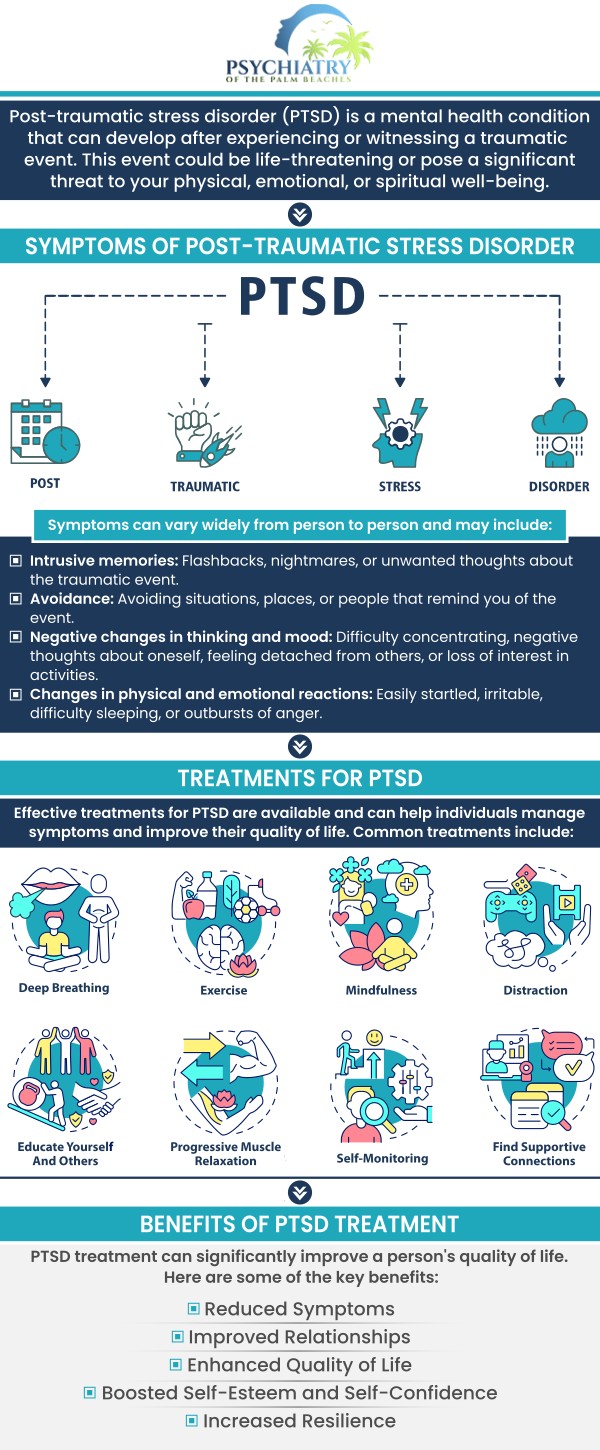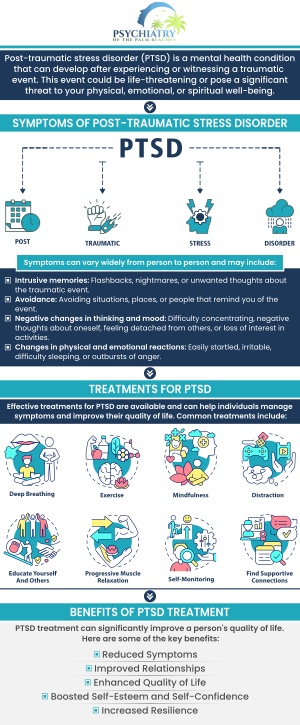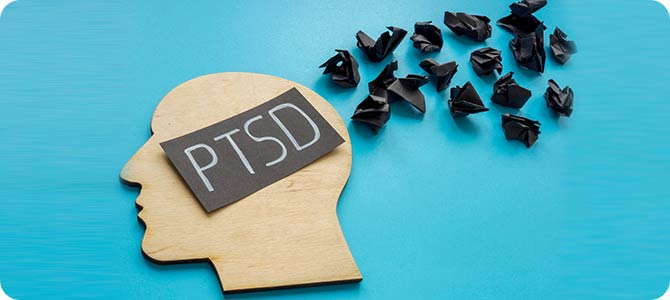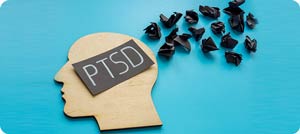PTSD Treatment Q&A
Help is available for those who suffer from post-traumatic stress disorder. If you are experiencing symptoms such as intrusive thoughts, avoidance, negative changes in thinking and mood, hyperarousal, and reactivity, then reach out to our team of healthcare professionals today at Psychiatry of the Palm Beaches. For more information, contact us today or book an appointment online. We have convenient locations to serve you in Jacksonville, Boynton Beach, Palm Beach Gardens, Stuart, Royal Palm Beach, Port St. Lucie, Melbourne, Fort Lauderdale, and Jupiter, FL.




Table of Contents:
What is post-traumatic stress disorder?
What causes post-traumatic stress disorder?
What are the four types of PTSD?
What are the symptoms of post-traumatic stress disorder?
What can trigger post-traumatic stress disorder?
The mental health condition known as post-traumatic stress disorder or PTSD can develop in some individuals who have experienced or witnessed a traumatic event. These individuals can be left with lasting consequences from the trauma and suffer from horrifying and often debilitating episodes, intense fear, and feelings of helplessness.
People with PTSD frequently have a heightened flight-or-fight response; their sense of danger is altered, leading them to feel afraid constantly and on edge, even when nothing dangerous is going on around them.
This sometimes, debilitating psychiatric disorder can leave a person feeling helpless and alienated from the world around them.
Not everyone may find the exact situations to be as traumatic or impactful as others. However, events such as a natural disaster, military combat, physical or sexual assault or abuse, or a severe accident can all lead to this disorder and trigger recurrent, intrusive reminders of the traumatic event.
Other known causes of PTSD include overwhelmingly stressful, frightening, or painful events. Whether they were experienced physically or emotionally does not matter. Not every individual who has experienced a traumatic event will develop the condition. Still, it is important to know that some people who have PTSD started having symptoms soon after the event, while others did not.
Here are four ways in which PTSD can show up in a person’s life.
Avoidance: A person who has PTSD may try to protect themselves from remembering and reliving the event at all costs. They might stay away from people, places, and even objects that could potentially bring back those memories that hurt them so much.
Alterations in cognition and mood: Someone with PTSD might block out certain parts of the experience that led them to have this condition as a protection mechanism. They might also develop negative beliefs about themselves, others, and the world in general (e.g., “I am useless,” “You can’t trust people”). Subsequently, they are left with a void that leaves them feeling estranged and detached from others. They are often unable to experience positive and joyful emotions.
Alterations in arousal and reactivity: Being irritable, unusually reactive, and suddenly having angry outbursts is not uncommon. Individuals may become paranoid, always watching and expecting the worst to happen, leading to trouble sleeping or concentrating.
Intrusion: Recurring intrusive thoughts that take the person back to the traumatic event vividly and frighteningly. Sometimes the individual cannot even distinguish between their present reality and the horrifying moment.
Symptoms of PTSD may include having flashbacks that cause the person to relive the disturbing experience repeatedly. Scary nightmares and constant negative thoughts about yourself or others are all common signs that someone may suffer from this mental health condition. Although not everyone experiences the same symptoms or even all of them simultaneously, most individuals will see a reduced interest in doing some of the things they once loved. Their joy for life may be considerably diminished, leaving them feeling empty and saddened.
Unfortunately, it appears as though almost anything can trigger a person’s PTSD; it will vary from individual to individual. Sometimes the most unexpected things might bring up a suppressed memory from the event and trigger a PTSD episode.
Things such as sights, sounds, smells, or even just thoughts that remind you of the traumatic event in some way, may lead you to disassociate from your present reality and take you back to the horrific moment. The team at Psychiatry of the Palm Beaches is here to help, so contact us. For more information, call us today or book an appointment online. We have convenient locations to serve you. We want to help you live your best life and our team of medical professionals will help treat PTSD. We serve patients from Boynton Beach FL, Delray Beach FL, Palm Beach Gardens FL, Jupiter FL, Stuart FL, Palm City FL, Royal Palm Beach FL, Wellington FL, Citrus Ridge FL, Jacksonville FL, Riverside FL, Port St. Lucie FL, Beau Rivage West FL, Melbourne FL, Palm Bay FL, Fort Lauderdale FL, Hollywood FL, Jupiter FL, North Palm Beach FL, and surrounding areas.
Check Out Our 5 Star Reviews



Additional Services You May Need
▸ Mental Wellness
▸ Relationship Coaching
▸ Depression and Mood Disorders
▸ Women’s Health
▸ Panic Disorder
▸ Medications Management
▸ Men’s Health
▸ Individual Psychotherapy
▸ Bipolar
▸ ADHD
▸ Geriatric Mental Health
▸ Couple’s Counseling
▸ Obsessive Compulsive Disorder
▸ Social Phobia Treatment
▸ Eating Disorders
▸ Post Traumatic Stress Disorder
▸ Psychotic Disorders


